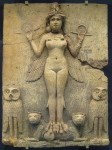On Easter, someone probably said to you, “Happy Sex Goddess Day!”
No? That didn’t happen?
Well, it probably did, and you just didn’t know it.
Easter = Pagan Sex Goddess
Have you ever wondered why we call the day that Jesus rose from the dead “Easter”? That word is not found anywhere in the Bible, so why do we call it “Easter”?
There are many theories about the origin of the word “Easter” but among the main contenders is the idea that it comes from the name of a sex goddess (or fertility goddess). Here are three such fertility goddesses:
- Ishtar, the Assyrian/Babylonian fertility sex goddess
- Eostre/Ostara, the Germanic fertility sex goddess
- Astarte, the Greek/Mesopotamian fertility sex goddess (referred to in the Bible as Asherah or Ashtoreth)
Our English word “Easter” seems to be drawn from the name of a pagan sex goddess.
Also, based on my research, our modern celebration of Easter appears to be a conglomeration of various parts and pieces of all three sex goddesses listed above.
In some of the traditions related to one or the other of these fertility sex goddesses, celebrants would rise early in the morning to observe the sun rising in the east.
In others, people would feast on ham.
In still others, children would go outside and hunt for decorated eggs. The eggs were supposed to have come from divine bunnies, which were revered for their ability to rapidly reproduce (… you know the saying: breeding like rabbits).
In others Easter traditions, it was thought that rabbits brought forth the light of spring from the sex goddess.
By worshipping the fertility sex goddess in these ways, the people were welcoming the longer days of spring, and were praying for fertile flocks and fertile fields.
The Truth of Easter
So is this why we call Easter “Easter”? Well, people argue over it, but wherever “Easter” (the name) really came from, there definitely seems to be numerous connections between the spring equinox, sunrise, new life, spring, bunnies, eggs, fertility rites, and a sex goddess.
So when then did the church adopt the practice of referring to the day Jesus rose from the dead as “Easter”? Some Christians, of course, refuse to call it “Easter” and refer to it instead as “Resurrection Sunday.” They do this because they know about the pagan roots of “Easter” and think that it detracts from what the significance of the resurrection of Jesus.
But does it? Is it wrong to refer to “Resurrection Sunday” as Easter?
I don’t think so. To the contrary, I think that “Easter” is a perfect name for the day we celebrate the resurrection of Jesus. I also think that when the church chose “Easter” to celebrate the day Jesus rose from the dead, they did this intentionally because of what the resurrection of Jesus signifies.
So what is the explanation? Why did the church choose to celebrate the resurrection of Jesus on Easter Sunday, which is named after a pagan sex goddess?
The reason the church adapted some of the symbolism and practices from their surrounding pagan culture is an interesting study, but the simplest explanation which makes the most sense to people today is found in our own culture.
 Have you ever seen t-shirts that say “God’s Gym” or “Abreadcrumb & Fish”? I’ve seen t-shirts with the Guitar Hero design, but on closer inspection, it says “God is my Hero.” Similarly, there are “Amazing Grace” t-shirts that look like the “American Idol” logo, and I have seen shirts with the superman logo, but with “JC” instead of “S.” I’ve seen a Staple’s “Easy” button with the word “Jesus” on it instead.
Have you ever seen t-shirts that say “God’s Gym” or “Abreadcrumb & Fish”? I’ve seen t-shirts with the Guitar Hero design, but on closer inspection, it says “God is my Hero.” Similarly, there are “Amazing Grace” t-shirts that look like the “American Idol” logo, and I have seen shirts with the superman logo, but with “JC” instead of “S.” I’ve seen a Staple’s “Easy” button with the word “Jesus” on it instead.
Is all this silly, commercialized, “Jesus Junk”? Yes. I roll my eyes at most of it. I cannot believe people make this stuff, but more than that, I can’t believe people buy it and wear it.
Of course, the reason companies make this “Jesus junk” is because it sells. People buy $4.6 billion of this stuff every year. And one reason Christians buy it is because such things help them bring Christ into culture. I would argue that there may be better ways of doing this, but that’s a different subject …
The point is that, 2000 years ago, some Christians decided to combine some of the sex goddess traditions of their culture with the celebration of the resurrection of Jesus. Why? Well, for one reason, the resurrection of Jesus and the sex goddess holiday occurred right around the same time of year.
But another reason is that they realized the same thing we do today: Why do some Christians have “iPray” hats and “Got Jesus?” bumper stickers? It’s an attempt to be contextual. Early Christians borrowed some of the symbolism of the various “Easter” celebrations they observed around them, and incorporated them into the celebration of the resurrection of Jesus.
But there is something even more important than that.
Should we just Fry the Eggs and Kill the Bunnies?
Some Christians are aware of where the “Easter” traditions came from, and, thinking of passages like Jeremiah 10:2 (Do not adopt the ways of the Gentiles…), refuse to say “Happy Easter!” Instead, they say “He is Risen!” Or “Happy Resurrection Day!”
Those are good things to say today, because, of course, this is the day we celebrate the historical event of Jesus rising from the dead.
But you want to know what? I’m also fine with saying “Happy Easter.” Is that because I worship Ishtar? Far from it. Have I adopted the ways of Ostara? No. Am I going to fall down in front of an Asherah pole? Of course not.
Instead, calling Resurrection Sunday “Easter” reminds me of my redemption. How?
Easter Redemption
 The simple fact that most people don’t know the origins of the word “Easter” shows that a shift has happened over the past 2000 years. The day has been redeemed. Though Easter is a commercialized holiday, most people still associate it with Jesus and His resurrection from the grave.
The simple fact that most people don’t know the origins of the word “Easter” shows that a shift has happened over the past 2000 years. The day has been redeemed. Though Easter is a commercialized holiday, most people still associate it with Jesus and His resurrection from the grave.
Of all the days in the year that people “go to church,” Easter is in the top two (the other being Christmas Eve). People associate “Easter” with Jesus; not with Ishtar.
The very fact that people think of Jesus rather than Ishtar when they say “Happy Easter!” is proof that this sex goddess holiday has been redeemed.
Because of this, Easter reminds me of what Paul says in 1 Corinthians 6:9-11. Though his readers used to be adulterers, fornicators, slanderers, thieves, drunkards, idolaters, and swindlers, they were not this way any longer. They were washed. They were cleansed. They were purified, sanctified, justified. They were no longer who they used to be. In a word, they were redeemed.
Similarly, we can talk about the way Ishtar Day used to be. We could talk about the rites, the rituals, and the pagan practices. But it is not that way any longer. Easter has been redeemed … just like you and me.
On Easter, rather than getting drunk and visiting a temple prostitute, most people celebrate the death and resurrection of Jesus. Yet we still call it Easter. This is redemption!
Sure, we might eat ham, look for Easter eggs, and give Easter candy. But when we do these things, nobody thinks about Ishtar. Most are just enjoying a fun day with the family (a wonderful Christian practice), and many others of us are remembering the death and resurrection of Jesus Christ (the most important event in human history).
Jesus is in the business of redemption. He not only redeems people, but He also redeems history, culture, places, events, customs, and holidays, “until all things are placed under His feet” (Eph 1:22-23; 1 Cor 15:27). Jesus has redeemed Easter.
So, this Easter, when you wish someone “Happy Easter!” remember that just as Jesus has redeemed a pagan sex goddess holiday, He has redeemed you as well.






Some interesting discussion going on over at my Facebook page for this post. So, for anyone who might be confused…here is the summary of this post:
1. The word “Easter” comes from the goddess “Ishtar.”
2. When people say “Happy Easter” they are not thinking about Ishtar, but about Jesus and the resurrection.
3. Therefore, the term “Easter” has been redeemed. It no longer refers what it once did.
4. This is just like what has happened to us in Jesus Christ and what Paul describes in 1 Cor 6.
http://www.facebook.com/notes/jeremy-myers/happy-sex-goddess-day/379679484159
Got Diana? The Divine One, The Virgin (frigid too!)
Everyone knows that you don’t have the power to redeem something evil you are not God. What fellowship can light have with darkness? After all didn’t God clearly say “learn not the way of the heathen and don’t worship ME the way they worship their gods?” So if you would read the entire book you would clearly see God gave us a map of how he wished to be worshiped by us and it never included any “redeemed holidays” Have a happy pagan sex god day if you like but as for me and my house we will serve the Lord and have a blessed Passover.
Paul states Christians are free in Christ to observe or not to observe days.
Romans 14:5
One person esteems one day as better than another, while another esteems all days alike. Each one should be fully convinced in his own mind.
Paul also chides the Galatians for their legalistic view on this issue:
Gal 4:10 – 11
You observe days and months and seasons and years! I am afraid I may have labored over you in vain.
I believe we have freedom in Christ to observe Easter and/or Passover or neither!
I agree! Thanks for weighing in.
I am thankful that although I was evil, God redeemed me!
AMEN!!! 🙏
So why not celebrate the resurrection in the manner and culture in which the Messiah actually lived? Why must we explain it away? I personally do not think that the Almighty is that whilly nelly. The Almighty redeems the culture through redeeming the people in that culture. We have been handed a truck load of lies and biblical translation changes since the Constintine Empire, and for me I would like to know the Hebrew origins of our faith.
Dean,
So you are saying that to truly follow God, we all basically have to adopt the Hebrew culture and customs which God wrote to them about in the Old Testament? It seems the early church argued exactly the opposite (Acts 15).
Easter in the US is about whatever you want it to be. In many cases it’s about eggs and bunnies as corporate America rakes in the extra money…others add something about Jesus to the mix so they feel like they got their Christian on.
This answer right there by Ransom Backus is the reason we should separate Resurrection day from the goddess name. Have you read the book by RC Sproul the Holiness of God. Excellant book. It’s time we as Christian’s celebrated the holiness of God by keeping His name holy.
What about the Almighty not to mingle His worship with any other gods, the first commandment strickly forbids this. and Yeshua’s death do not “do away” with that instrcution!
Chocolate with Easter brings a whole new meaning…. HA!
Well as far as I understand Easter in non-English speaking countries it is called Pasch which is related to Passover. Medieval Europe forbade eggs during lent so eggs were boiled and preserved as a treat celebrating the end of lent. There’s just many many traditions surrounding Easter. Cultural assimilation is virtually unavoidable.
Yes, Pasach is related to Passover. Many do eat eggs as part of Pasach. I never considered this connection, but it could very well be. As you say, cultural assimilation is virtually unavoidable.
Dean. I think J.D. is saying that it doesn’t matter what Easter used to be, so long as we recognize and follow the christian definition of the holiday. I know of no one (certainly not christians) who use the holiday to worship pagan gods.
Well I disagree, it does matter….whether we do not worship other gods or not, we use the same symbolisms, like the egg and the bunny, pagan symbols of fertility.
Not all christians observe these traditions. Some of us use this time of year to consider the importance and impact of our Lord’s actions. In any case, almost all symbols (stars, eggs, even crosses) have, at some time, been used by pagans. This makes the usage of the symbol evil, not the symbol itself. It is not our place but God’s to judge and He judges by what is in our hearts.
Dean, there is nothing pagan about bunnies and eggs. Both are from God. The wonderful thing about symbols is that they can be redeemed.
The cross is a perfect example. It used to symbolize torture and power of the Roman Empire. Now it has been redeemed to symbolize the victory of Jesus over sin, death, and the devil.
If we are throwing out all “pagan” symbols, we better start with the cross.
Agreed! Because it is not so much the instrument of death that is important but that his blood was shed, that is what renews the covenant and grafts us into the vine.
I have no problem with symbols as icons representing (thus helping us remember) certain people or events. My problem lies with those who clam that the symbols have some kind of mystical powers. I feel the same about rituals. Properly used, they help us remember important things (like communion) but they have (and should be known to have) no other power.
Unfortunately for that Easter is redeemed perspective, we have fully arrived in the Information Age… and people are falling into knowledge as easily as they would be invited to an Easter Sunday service. Fortunately the majority of Christianity, at least western Christianity is as bunk and twisted as this example… begin to read scripture in its original languages and you will see that He has not Risen…. He Rose. Past tense.. signifying a complete restoration of all humanity, not by our choice but by His love… it’s done people. In the end we will all come into perfect completion and begin to be like Christ… but I try not to delay that until after death… but live it now.
The Christ I read about would flip tables and be extremely upset over anyone tainting or mixing pure worship to His Father. Why would a Christian accept that it is OK to have a commemoration to Jesus named after a fertility God and then not just follow the mandate layed out by Jesus on Passover to remember him. It seems they love the world and tradition so much that they can’t just drop ALL the dirt from the honest tradition and follow instruction. Plus, it is sad that Christians would take up any EMBLEMS to assist in worshipping God when the Scriptures are an explicit and incredibly long account of God’s people forever in conflict with the issue of idolatry/ idol worship. It would serve the Christians well to follow the practice of early Jews and Christians and not take on using any such devices in worshipping God. Muslims to this day do not accept images and such in their worship and it is confusing as to why Christianity can’t follow suit in worshipping an invisible God in doing the same, especially when their history preceded Islam and wrote the book ( so to speak) on such pure worship.
Read Deut. 13:30-31. That is what YHVH has to say about co-opting pagan rituals and holidays and using them to worship Him! Furthermore, Yeshua died on Passover and resurrected on Firstfruits; both of those feast days God Himself picked as “national holidays” in Lev. 23. That’s how He wants his people to remember and worship him—forever!
Easter is totally pagan and should not be celebrated as Jesus Christ death!
It’s a Babilonian tradition and nothing to do with Jesus!
I would imagine the one above would be disgusted with it.
I really enjoyed your article, it was on point and revealing…..my only disagreement is when you state the word Easter is not in the Bible …..That is incorrect.
Where is the word Easter in the Bible???? You should have posted book, chapter and verse, sir. I have never read the word Easter or Rapture in Gods holy word.